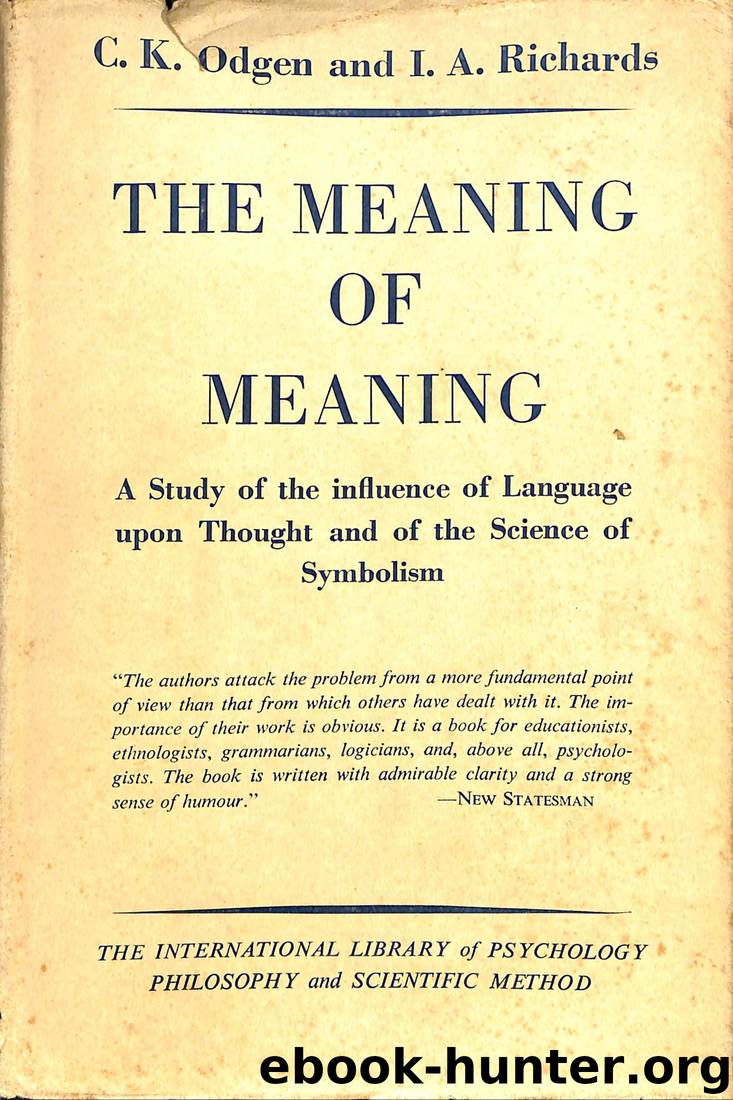The Meaning of Meaning by C. K. Ogden & I. A. Richards

Author:C. K. Ogden & I. A. Richards [Ogden, C. K. & Richards, I. A.]
Language: eng
Format: epub
Tags: Philosophy
Publisher: A Harvest Book / Harcourt, Brace and Co.
Published: 1946-01-15T05:00:00+00:00
he “did not really mean to deny that the lark belongs to the class Aves ”; and conversely a statement adequate symbolically may have little emotional effect. Exceptions occur, but this conflict is so general that the usual antithesis between analysis and intuition, between science and art, between prose and poetry, are justified. They are due simply to the fact that an arrangement of symbols which will reinstate a situation by evoking emotions similar to those originally involved will, as things happen, very rarely be an adequate symbol for it. M. Bergson and the analysts are therefore both in the right, each maintaining the importance of one of the two functions of language. They are in the wrong only in not seeing clearly that language must have these two functions. It is as though a dispute arose whether the mouth should be for speaking or for eating.
The complexities and ambiguities in the use of language for purposes of evocation are admittedly not less than those from which scientific language suffers. But when two people differ in what they are in ordinary usage perfectly correct in calling “their interpretations of a poem or a picture, the procedure to be adopted is quite other than that advisable should they differ in their interpretations of a physicist’s remarks. None the less, there is, in the two cases, an underlying similarity due to the fact that both are sign-situations though only the second is symbolic in the strict sense of the term.
The difference between the two uses may be more exactly characterized as follows: In symbolic speec the essential considerations are the correctness o tie symbolization and the truth of the references. n evocative speech the essential considerations are the correctness of the symbolization and the truth of the references. In evocative speech the essential consideration is the character of the attitude aroused. Symbolic statements may indeed be used as a means of evoking attitudes, but when this use is occurring it will be noticed that the truth or falsity of the statements is of no consequence provided that they are accepted by the hearer.
The means by which words may evoke feelings and attitudes are many and offer an alluring field of study to the literary psychologist As sounds, and again as movements of articulation, and also through many subtle networks of association, the contexts of their occurrences in the past, they can play very directly upon the organized impulses of the affective-volitional systems. But above all these in importance, heightening and controlling and uniting these subordinate influences, are the rhythmic and metrical effects of word arrangements. If, as may reasonably be supposed, rhythms and especially metres have to a small degree an hypnotic effect, the very marked difference in evocative power between words so arranged and words without recurrent system is readily accounted for. Some degree of hyperesthesia would be a convenient assumption to explain further the greater sensitiveness to vowel and consonantal characters which accompanies metrical reading, and the flat or tinny effect of the same syllables occurring in vers libres.
Download
This site does not store any files on its server. We only index and link to content provided by other sites. Please contact the content providers to delete copyright contents if any and email us, we'll remove relevant links or contents immediately.
Cecilia; Or, Memoirs of an Heiress — Volume 1 by Fanny Burney(32544)
Cecilia; Or, Memoirs of an Heiress — Volume 2 by Fanny Burney(31942)
Cecilia; Or, Memoirs of an Heiress — Volume 3 by Fanny Burney(31929)
The Lost Art of Listening by Michael P. Nichols(7490)
Asking the Right Questions: A Guide to Critical Thinking by M. Neil Browne & Stuart M. Keeley(5757)
We Need to Talk by Celeste Headlee(5608)
On Writing A Memoir of the Craft by Stephen King(4935)
Dialogue by Robert McKee(4386)
Pre-Suasion: A Revolutionary Way to Influence and Persuade by Robert Cialdini(4219)
I Have Something to Say: Mastering the Art of Public Speaking in an Age of Disconnection by John Bowe(3872)
Elements of Style 2017 by Richard De A'Morelli(3339)
The Book of Human Emotions by Tiffany Watt Smith(3300)
Fluent Forever: How to Learn Any Language Fast and Never Forget It by Gabriel Wyner(3077)
Name Book, The: Over 10,000 Names--Their Meanings, Origins, and Spiritual Significance by Astoria Dorothy(2978)
Why I Write by George Orwell(2944)
Good Humor, Bad Taste: A Sociology of the Joke by Kuipers Giselinde(2941)
The Art Of Deception by Kevin Mitnick(2796)
The Grammaring Guide to English Grammar with Exercises by Péter Simon(2739)
Ancient Worlds by Michael Scott(2682)
